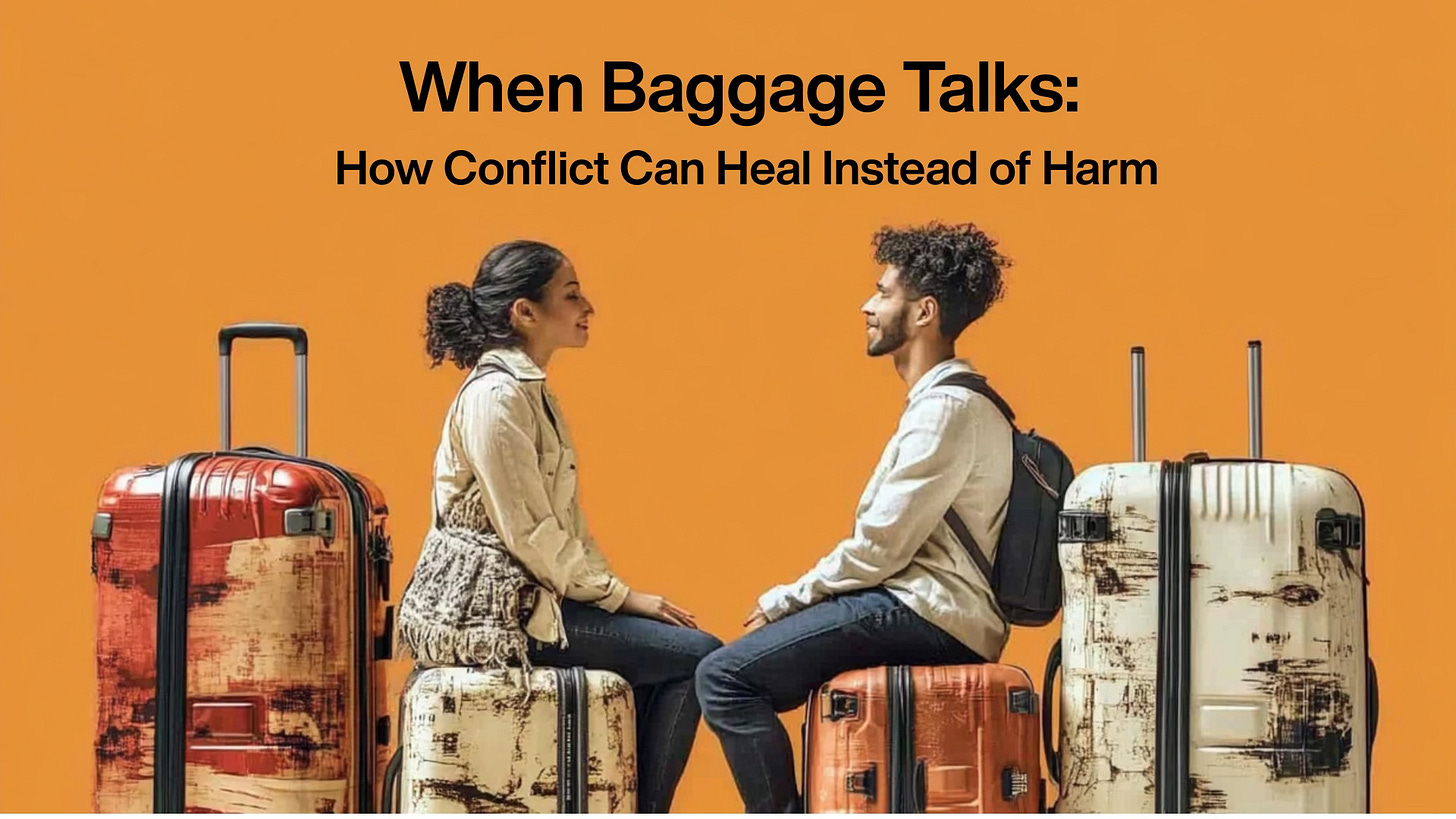How Conflict Can Heal Instead of Harm
The best part of conflict resolution is that every time I get to the other side of the issue with the “other” person, our relationship becomes better, stronger — and richer.
If you enjoy this post, please subscribe to receive more. Also, help others discover this work by sharing and clicking like.
We all experience conflict in one way or another, almost daily. It’s just a part of life.
We experience it at work with our bosses and co-workers — at home, with our family, our kids, our parents and siblings. And yes… with ourselves, if we’re self-aware.
We argue and fight all the time. Sometimes it’s minor — other times, major, causing considerable problems, divorces, and life-long resentments. On the world stage, wars get ignited.
"The quality of our lives depends not on whether or not we have conflicts, but on how we respond to them."
— Thomas Crum
It’s not if we experience conflict, it’s when we experience it — what do we do?
Let’s face it. Most people don’t handle or respond well to conflict.
Do you think you handle it well?
It’s a natural part of life
We need to understand and come to accept that conflict is a natural and inevitable part of being human. Some may say it’s God’s way of entertaining himself.
Where there are people, there are relationships. And where there are relationships, there is conflict.
Why do we have it?
It arises from differences in needs, values, goals, perceptions, or communication styles.
And, most importantly, our baggage.
There are three types of conflict:
Intrapersonal: Within oneself (internal dilemmas or stress).
Interpersonal: Between individuals (e.g., coworkers, friends).
Organizational/Group: Between teams or departments with competing priorities.
I want to focus on interpersonal in this essay.
First of all, I’m no expert, but I’ve had a lot of experience doing it wrong. Very wrong. And, I’ve had a lifetime of doing it better, not perfect, but much better. Fortunately, I’ve had enough recovery and therapy, and friends who know the ‘how to” of dealing with personal conflict, and who, inadvertently, have taught me a lot in our interactions. I’ve learned by “doing.” By interacting.
The best part of conflict resolution is that every time I get to the other side of the issue with that “other” person, our relationship becomes better, stronger — and richer. I mean, amazingly better and richer!
So… through conflict, we become closer as a couple and/or as friends. And I LOVE that!
Most of my conflict resolution experience comes from my close relationships, like my marriage and very close friends. We know that marriages have conflict, and we either grow or go. And, I think for any friendship to last long and be a “good” friendship, it must grow and evolve, as well. And to grow, conflicts need to be addressed and worked through.
I’ve learned that most of our deeper conflict arises from our baggage. Our past and upbringing. Stuff gets triggered, and we react, rather than responding in an emotionally balanced manner.
"We don’t see things as they are, we see them as we are."
— Anaïs Nin
A profound reminder that our inner world filters everything we encounter.
It all begins with self-awareness.
My opinion is that we must have some level of self-awareness for all of this stuff to work. The reason: We see the world through the filters of our baggage.
As we become aware of what makes us tick, we realize that what Judy did, as an example, might be our reactions seen through the filter of over-controlling behaviors. Perhaps one of our parents was extremely controlling, negatively affecting us when we were a child. Therefore, we might have a sensitivity to people who are controlling.
With that awareness, I can understand the “why” of my intense reactions. I may come to realize that it wasn’t as much about what or how Judy said something, but it was also about my sensitivity to controlling people, actions, and dialogue that made me react so feverishly.
Rather than seeing the interaction through the filters of my past (my issues and triggers), self-awareness enables me to step back and see it as it is, much like removing sunglasses while indoors.
We have to know and understand our triggers.
I’m fortunate to have a wife who has a lot of self-awareness and handles conflict well. That doesn’t mean that we each do it perfectly. But we have a willingness to walk with love toward a resolution done through healthy conversation. A key for us is that we take ownership of our individual baggage and issues (our issues in our tissues), which allows us to get to the real point at hand. However, it doesn’t always happen immediately.
Recently, I was triggered by something a course leader and facilitator did. She’s always asking for feedback on various things, so I took that opportunity to express myself. As I was writing the email, I realized that I had been triggered. I was emotionally charged, seeing the world through my baggage-filtered sunglasses.
I wasn’t at my best, nor was I emotionally balanced, “I believe.” Sometimes we are harder on ourselves than necessary, and sometimes not hard enough. But “my” perspective was that I wasn’t at my best.
Anyway… I gave some feedback that may have been hard to hear.
It could have been a bad moment for both of us, as it could have easily gotten out of hand. However, her response was amazing! She didn’t react from her past or baggage. She stood tall, had self-awareness of her issues, making it easy to respond, not from her baggage, but from an emotionally balanced position.
I don’t remember exactly what she said, but I remember the feeling. Her response let me know that it was safe to express myself even if I’m speaking through my past or baggage. It was apparent that she had a lot of self-awareness and took ownership of any “Stuff” from her past.
When we feel safe, miracles happen. For all of us, I believe. When I feel safe, I can better own “my stuff.” And when I can feel safe enough to own my stuff, I can heal.
Don’t tangle, tango.
Tangle is a fight two people might have. Tango is a dance where two people swing and sway as they healthily resolve conflict. My experience is when one stands tall and doesn’t take the “baggage bait,” a tangle can’t happen. And when one stands tall, not taking the “baggage bait,” it sets the stage for the second person to pause and reflect, meaning there’s hope for vulnerability and resolution — and healing.
In my experience, there are a few basic principles I try to adhere to when in conflict with another person.
First,
Seek first to understand, rather than to be understood.
Practice active listening. Don’t interrupt. Reflect on what you’ve heard. This shows respect and can de-escalate tension quickly. Sometimes I can detach from the discussion as if I were a 3rd party helping a friend, probing, listening with empathy, and love. I acknowledge and validate their feelings. Feelings can’t be wrong. Facts can. But feelings are their feelings regardless. The best I can do is listen and validate.
Then I can share my feelings. And remember, our feelings are processed through our baggage filters. If they are able to, they will validate my feelings, and I will feel heard and understood.
For this to work well, we must take responsibility for “our” part, even if small. Responsibility builds trust. Blaming only fuels the fire, leading to defensiveness and more division.
It’s at that point, getting to the real issue can be accomplished. For me, it’s hard to make any progress until I feel heard and understood. That’s just me.
Steps.
Start by calming yourself with deep breathing.
Seek first to understand them, rather than trying to make them understand you first.
Acknowledge their feelings by using active listening skills.
Own your stuff. Take responsibility for your baggage or your part.
Give space if needed. Sometimes I need time and space to process.
Follow up.
In conclusion, I can’t emphasise enough the power of good and healthy conflict resolution. In the beginning, it’s hard, it’s painful. But each time I practice it, the relationship (and life) gets sweeter and richer.
Remember: Through conflict, we become closer as a couple and/or as friends.





